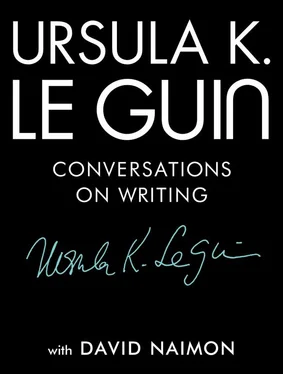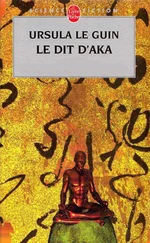Only in silence the word,
Only in dark the light,
Only in dying life:
Bright the hawk’s flight
On the empty sky.
Each summer since our summer in the Steens, the wildfires have worsened and spread. The contemplation of nature is now an inevitably political thing. As we continue to look up at a sky that has been humanized, that reflects back our own light, our own selves, rather than that of otherness, that no longer prompts us to pause in awe and contemplate, the opportunities to create fellowship seem to diminish. It’s the attentiveness of poetry, of Ursula’s poetry in particular, that enacts ways to still do so.
—David Naimon
• • •
DAVID NAIMON:You’ve talked about the phenomenon that happens sometimes when you’re writing a novel, that you hear a voice, the voice of another inside of you, a voice that becomes the character that tells the story for you. I was wondering if you feel like writing poetry involves a similar voice.
URSULA K. LE GUIN:Well, that’s complicated. I don’t write very many persona poems, which is the equivalent of the voice of a character dictating to you in a novel. I have written some, but poems come in their own, different way. It tends to be a few words or even just a beat, with a kind of aura about them, and you know then that there is the possibility of a poem there. Sometimes they come very easily, but I’ve never felt like I was taking dictation with a poem the way I have felt with novels, like the voice speaking through me was so certain of what it wanted to say that I didn’t have to argue.
DN:I know you don’t write haiku, but there are a lot of poems in Late in the Day that I suspected might share a sensibility with haiku. It drove me to Robert Hass’s introduction to The Essential Haiku to see if my instincts were true in this regard. Hass says that haikus are attentive to time and space, that they are grounded in a season of the year, that the language is kept plain with accurate original images drawn from common life, and that there’s a sense of the human place within the cyclical nature of the world. Do you recognize those qualities in your poems?
UKL:Yes, I feel totally at home with that. The thing about haiku is the form doesn’t work for me in English. I don’t think syllabically, I think rhythmically. The syllable count just doesn’t give form to me. That’s a shortcoming in me, not in the form, so my equivalent of the haiku is the quatrain, which is, of course, a very old English form, with mostly iambic or trochaic rhythm, and often with rhyme.
DN:Are there some particular examples of poets who write in quatrains that you love?
UKL:A. E. Housman is the absolute master of the quatrain. I grew up with Housman from twelve or thirteen on. He goes deep.
DN: Booklist has a review of one of your earlier collections called Going Out with Peacocks , and in it, the reviewer says that the book can be divided into poems about nature from which political concerns are not entirely absent, and other poems that are political where nature is not entirely absent. [Le Guin laughs.] This seems true of the poems of Late in the Day as well. It’s interesting how, even in the nature poems we get the sense, in the background, of either political concern or political uneasiness. You frame this well in the foreword to the collection, a reprint of a talk you gave at the “Anthropocene: Arts of Living on a Damaged Planet” conference at UC Santa Cruz.
UKL:How can you write about nature now without—well, I guess we have to call it politics—but without what we have done to our world getting into the poem? It’s pretty hard to leave that out entirely.
DN:But if a reader were to skip the foreword and read some of the poems, one might think, on first glance, that there is nothing political in Late in the Day . The foreword seems to suggest that the advocacy for stillness and silence and fellowship is, in and of itself, a radical act.
UKL:Yeah, I suppose so. Yes.
DN:There are many nods in this collection to the relationship to time.
• • •
Riding the Coast Starlight
I saw white pelicans rise
from the waters of morning
in the wide valley, going.
I saw trees white with snow
rise silent from clouds
in the deep mountains, returning.
Heavy, noble, solemn the gesture
of the wings, the branches, a white writing destruction.
UKL:It is, after all, called Late in the Day . [Laughs.] It was written in my mid-eighties, so there’s a lot about that.
DN:At various moments you say, “Time is being,” “Time is the temple,” and in “The Canada Lynx” you evoke the virtue of moving in silence through space without a track and disappearing. This sentiment feels very much akin to Taoism, to a Taoist evocation of time and space.
UKL:There is almost certainly Taoism in it, because it got so deep in me and everything I do. There’s some Buddhism, too, and of course “The Canada Lynx” is also an elegy, because we’re losing the lynxes—they are leaving quietly. So, there’s a mixed feeling there—it’s praise for being able to move quietly but also lament for the disappearance, for the going away.
DN:In the foreword you talk about the importance of fellowship with the nonhuman other. And by “nonhuman other” you are referring not just to animals and plants, but also stones and even the objects that we as humans have fashioned for our own use. Your poem “The Small Indian Pestle at the Applegate House” is a great example of this. The repetition of words—hand, held, hold—really evokes this sense of repeated fellowship, not only with the object but also with others who have used it before and with the person who originally made it. In that same speech you talk about being against the idea of the “techno-fix.” I bet a lot of people assume when they see this, a poem about a pestle, and a philosophy opposed to the techno-fix, that you are antitechnology.
UKL:Oh, yeah. I’m labeled a Luddite instantly.
DN:Can you parse that out a little bit for us? Because it seems like the pestle is a technology just as language is a technology.
UKL:Of course it is, it’s a great technology, and it lasted us for hundreds of thousands of years. My objection to the use of the word “technology” these days, is that people think “technology” means “high technology,” resource-draining technology such as we delight in. And of course, a mortar and pestle is a very refined technology and a very useful one. All of our tools, the simplest tools, are technology, and a lot of them have been perfected—you can’t improve upon them for what they do. A kitchen knife. It does what a kitchen knife does in human hands and you can’t beat it. You can get an elaborate machine that slices meat for you and so on, but there you go. You’re beginning to seek the save-time or don’t-touch-it-yourself thing that high tech leads us toward. I just keep finding this, people saying, “You’re antitechnology.” Well, come off it. [Both laugh.] I write with a pen or pencil or on a computer. That’s my job. I use technology all the time, but if I didn’t have the computer or the pen or the pencil, I would end up scratching it on wood or stone or something.
• • •
The Small Indian Pestle at the Applegate House
Dense, heavy, fine-grained, dark basalt
worn river-smooth all round, a cylinder
with blunt round ends, a tool: you know it when
you feel the subtle central turn or curve
that shapes it to the hand, was shaped by hands,
year after year after year, by women’s hands
that held it here, just where it must be held
to fall of its own weight into the shallow bowl
and crush the seeds and rise and fall again
setting the rhythm of the soft, dull song
that worked itself at length into the stone,
so when I picked it up it told me how
to hold and heft it, put my fingers where
those fingers were that softly wore it down
to this fine shape that fits and fills my hand,
this weight that wants to fall and, falling, sing.
DN:And it feels like the quote you have from Mary Jacobus, where she says that “the regulated speech of poetry may be as close as we can get to such things—to the stilled voice of the inanimate object or the insentient standing of trees,” that perhaps this regulated speech is a form of technology also, to aid us in moving toward fellowship or contemplation.
Читать дальше









